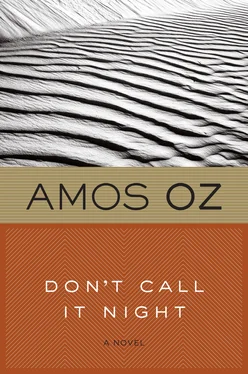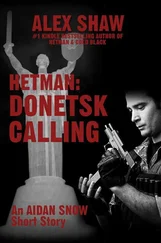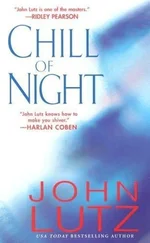Muki Peleg said: It's a beautiful evening. And you're beautiful too.
Thanks, I said. I liked your expression "floating youngsters". By the way, listening to groovy music at your place and all that, try not to hurt Linda. She's not that strong.
Nothing but love, Muki exclaimed, laying his hand on his chest in a gesture of offended probity. Love and nothing but love, that's what she gets from me. And there's plenty to go round, so if you happen to need some you know where to come. I'll make you float too.
Most of the shops were closed by now. The shop windows were sparingly lighted. People were strolling unhurriedly up and down the square, couples, parents and children, mothers with baby carriages, and four tourists in casual clothes, baked by the desert sun. Pretty Limor Gilboa, in red trousers and high heels, was walking between two suitors, who were both talking to her at once. Anat and Ohad, a young couple, she was in my class not long ago, were standing whispering in front of Bozo's shoe shop. In the window Pini Bozo has hung a photo of his wife and baby son in a black frame decorated with coral. In a fit of unrequited love, a soldier aged seventeen and a half shot them and everyone else in the shop.
A few old people were sitting on the municipal benches near the beds of petunias conversing in low voices. Among them I could see Blind Lupo, sitting at the end of the bench, surrounded as usual by a flock of pigeons that were bold enough to perch on his knees and shoulders and eat maize from his outstretched hand. His Alsatian dog was dozing at his feet, oblivious to the massed pigeons. The blind man's foot struck the dog's back and the man hastily apologized. Meanwhile, every minute the traffic lights changed colour, even though there were no cars waiting. In front of Ecstasy Boutique, Women's Lingerie, an army officer from Ethiopia in a Givati Brigade beret was staring into the window with his mouth half-open.
As we were crossing Ben Gurion Boulevard the streetlights came on. There was no need for them yet, because the daylight was still fading very slowly. Half the sky was lighted by a red glow broken by wispy clouds. Behind the usual evening sounds, a woman calling a child to come in this minute, sentimental music from the Palermo, the murmur of metal signboards shaken by the westerly breeze, there was a deep, wide silence. At the place where Ben Gurion Boulevard ends and the greying expanse commences, two bulldozers, one of them enormous, were parked, and next to them the night watchman had lighted a smoky brushwood fire and he and his three dogs were motionless on the ground staring into the fire. Overhead a gliding raven made a black stain against the cloud-strewn blaze of the twilight. Here came another. And two more.
Twenty years ago there was still a bare plateau here hemmed in by grey hills. It was crossed only by a vague dirt track leading to the military installations in the valley behind the cliff. Now there are nine thousand inhabitants, a draft of a real town, flat, not entirely clear to itself, and already beginning to expand slowly over the plateau. There are some fifteen thoroughfares, perpendicular or parallel to each other, and all of them lead to the desert. People from thirty different countries live in five symmetrical districts, go to work or to the café, put their money in savings accounts, change the baby's diapers, change their curtains or their solar water-heaters, make an extra room by walling in the rear balcony. As if this has always been here. And there is a health clinic, a library, a hotel, a little industry, and henceforth there is also a string quartet that arrived only a fortnight ago from Kiev. A miracle, Avraham Orvieto said the first time he came after the death, sometimes, for an instant, you could see it as a miracle, a minor one at least. And he added: Immanuel loved Tel Kedar. It was his home.
The soil for the little gardens has been brought from far away by the residents, in trucks, and they have covered the dusty flint gravel with it as if they were dressing a wound. The dust constantly makes its way back from the open expanse, straining to reconquer its original terrain. And yet the gardens hang on and refuse to be dislodged. In a few places the treetops have grown higher than the roofs. Swallows have found their way here from far away, and perch in the treetops. Peaceful, homely, almost gentle, that's how President Shazar Street seems to me at seven o'clock in the evening, at a time when the day is departing and the sky is still on fire. In every flowerbed the hoses start their dripping at the same moment, operated by a tiny electrical impulse from the municipal irrigation computer. As the sun goes down the sprinklers begin to revolve in the little park and the façade of Founders' House is illuminated by beams from a floodlight concealed among the hibiscus bushes.
On a balcony we saw a handwritten cardboard placard: "for sale or to lett". That's the new estate agents, Bargeloni Bros, Muki said: They're such morons it's a wonder they didn't write sail. I said that actually I quite enjoyed living in a place that was twenty-five years younger than me, you could watch the life evolving. Muki said with a laugh: Nought out of ten for arithmetic, Noa, what do you mean twenty-five years, you don't look a day over thirty-three and a half, and you're getting younger every day — if it goes on like this you'll be ten soon. Blushing again, are you? Or is it just my imagination? After a minute or two, when he took in what I had said, he added in a different voice: Listen, one of these days I'm going to take things into my own hands and rig up some device with my own eleven fingers that'll hide or change those awful solar panels and TV aerials. Make it look a bit nicer round here.
I said: And the cypresses will grow taller, and we'll have a pretty skyline against the background of the mountains and the cliffs.
Muki said: And then they'll build Notre-Dame here and the Eiffel Tower; they'll fix us up with a river through the middle, with boats and anglers and everything, I'll be the building contractor and take charge of the lot, on condition that you'll kiss me on the bridge at night.
I nearly kissed him on the spot, in President Shazar Street, such a frantic, dishevelled boy; I restrained myself, and only said: It's almost pretty as it is. That is, so long as you remember when it started and what it was like before. A barbed-wire army camp in the middle of nothing. It started from sand and fantasies, where have I heard that?
Hardly started, and now there's no stopping her, as the empress's hussar said when they asked him how he got so thin, Muki said. Sorry. It just slipped out. Don't be angry.
And what sort of groovy music was it that he played to Linda whenever they walked out of the film halfway through and went back to his apartment?
Music for the soul. The Sword Dance. Bolero. He had loads of tapes that all kinds of girls had given him over the years. If I went, he'd leave the choice to me, and he'd make me a really explosive cocktail, out of this world. A couple of days ago Linda dragged him to a concert in a private house, at Dr. Dresdner's. That quartet from Russia played something sad and then they put on a record, even more depressing, the song of the dead children. It must have been Mahler, I said, Kindertotenlieder. One of them, called "When thy mother dear", gives me the shivers whenever I hear it, or even just think about it. Muki said, Look, I'm not really into all this stuff, Mahler, Germany, philosophies, but the honest truth is, I almost felt like crying there the other night from the music about dead children. It seems to get right inside you through your skin, not your ears. Through your hair even. If there's one really bad thing in the world, worse than bad, terrible, it's children dying. I'm against children dying. That's the only reason I'm on the committee. What did you think? That's why I'm going to this meeting now.
Читать дальше












